七年级上册英语期中考试知识点
2024年新人教版七年级上册英语期中总复习

98→__n_i_n_e_ty_-_e_ig_h_t________________
(3)百位数与个位数之间要加and。 例如:201→_t_w_o__h_u_n_d_r_e_d__a_n_d__o_n_e____
a friend of mine __我__的__一__个__朋__友_ 名词所有格练习: 1. L_i_m__in_g__’s__p_a_r_e_n_t_s___________( 李 明 的 父 母 )work in a big hospital.
2. _J_o_h_n__’s__a_n_d__S_a_l_ly__’s__m_o__th__e_rs_______(John和 Sally的母亲) are American.
10-5=5 Ten minus five is five. (十减五等于五)
(6)基数词可以用来表示年龄。 例如:She is five years old.
可数名词与不可数名词的概数表达
只能修饰可数名 few, a few, quite a few, many, too many, a (large)
词
number of.
只能修饰不可数 little, a little, quite a little, much, too much, 名词
可数名词与不可 some, any, lots of, a lot of , plenty of, two
【注】 ① ch读/k/时,其复数形式应加s, 如stomachs(胃,腹部)
② 常见的以o结尾要加es的有如下几个: hero, Negro, tomato, potato, mango,可记 为“黑人英雄爱吃两菜一果”。
仁爱版七年级上册英语期中复习|语法 知识点总结及练习题(含答案)
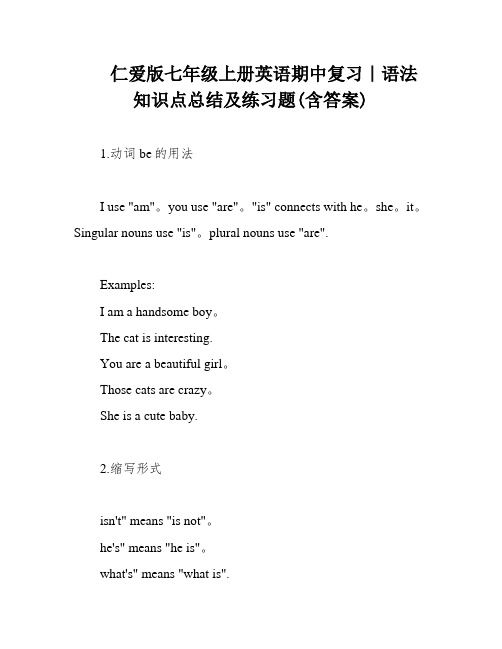
仁爱版七年级上册英语期中复习|语法知识点总结及练习题(含答案)1.动词be的用法I use "am"。
you use "are"。
"is" connects with he。
she。
it。
Singular nouns use "is"。
plural nouns use "are".Examples:I am a handsome boy。
The cat is interesting.You are a beautiful girl。
Those cats are crazy。
She is a cute baby.2.缩写形式isn't" means "is not"。
he's" means "he is"。
what's" means "what is".3.人称代词Subject pronouns: I。
you。
he。
she。
it。
we。
they。
Object pronouns: me。
you。
him。
her。
it。
us。
them.4.物主代词Pronouns that indicate n or ownership are called possessive pronouns。
also known as possessive case。
There are two types: noun possessive pronouns and adjective possessive pronouns.Adjective possessive pronouns must be placed before the noun。
modifying and limiting the noun as an attributive。
七年级英语上册期中应考重点

七年级上册期末英语复习Starter Units 1 — 3【重点单词】good /gud/ adj. 好的morning /'mɔ:niŋ/ n. 早晨;上午Good morning! 早上好!hi /hai/ interj. (用于打招呼)嗨;喂hello /hə'ləu/ interj. 你好;喂afternoon /,a:ftə'nu:n/ n. 下午Good afternoon! 下午好!evening /'i:vniŋ/ n. 晚上;傍晚Good evening! 晚上好!how /hau/ adv. 怎样;如何are /a:/ v. 是you /ju:/ pron. 你;你们How are you? 你好吗?I /ai/ pron. 我am /æm/ v. 是fine /fain/ adj. 健康的;美好的thanks /θæŋks/ interj.&n. 感谢;谢谢OK /əu'kei/ interj.& adv. 好;可以what /wɔt/ pron.&adj. 什么is /iz/ v. 是this /ðis/ pron. 这;这个in /in/ prep. (表示使用语言、材料等)用;以English /'iŋgliʃ/ n. 英语adj. 英格兰的;英语的in English 用英语map /mæp/ n. 地图cup /kʌp/ n. 杯子ruler /'ru:lə/ n. 尺;直尺pen /pen/ n. 笔;钢笔orange /'ɔrindʒ/ n. 橙子jacket /'dʒækit/ n. 夹克衫;短上衣key /ki:/ n. 钥匙quilt /kwilt/ n. 被子;床罩it /it/ pron. 它a /ə/ art. (用于单数可数名词前)一(人、事、物) that /ðæt/ pron. 那;那个spell /spel/ v. 用字母拼;拼写please /pli:z/ interj. (用于客气地请求或吩咐)请color /'kʌlə/ n. (=colour) 颜色red /red/ adj.& n. 红色(的)yellow /'jeləu/ adj.& n. 黄色(的)green /gri:n/ adj.& n. 绿色(的)blue /blu:/ adj.& n. 蓝色(的)black /blæk/ adj.& n. 黑色(的)white /wait/ adj.& n. 白色(的)purple /'pə:pl/ adj.& n. 紫色(的)brown /braun/ adj.& n. 棕色(的);褐色(的)the /ði; ðə/ art. 指已提到或易领会到的人或事now /nau/ adv. 现在;目前see /si:/ v. 理解;明白can /kæn/ modal v. 能;会say /sei/ v. 说;讲my /mai/ pron. 我的【重点短语】1. good morning/afternoon/evening 早上/下午/晚上好2. good night 晚安3. thank you = thanks 谢谢你4. in English 用英语5. CD 光盘,激光唱片6. BBC 英国广播公司7. NBA (美国)全国篮球协会8. P 停车场,停车位9. kg 千克,公斤10. S 小号的11. M 中号的12. L 大号的13. UFO 不明飞行物【重点句型】1. —Hi, Helen! How are you? 嗨,海伦!你好吗?—Hi, Eric! I'm fine,thanks. 嗨,埃里克!我很好,谢谢。
新仁爱版七年级英语上册期中复习专题01 重点词汇,短语,句子归纳(默写版)
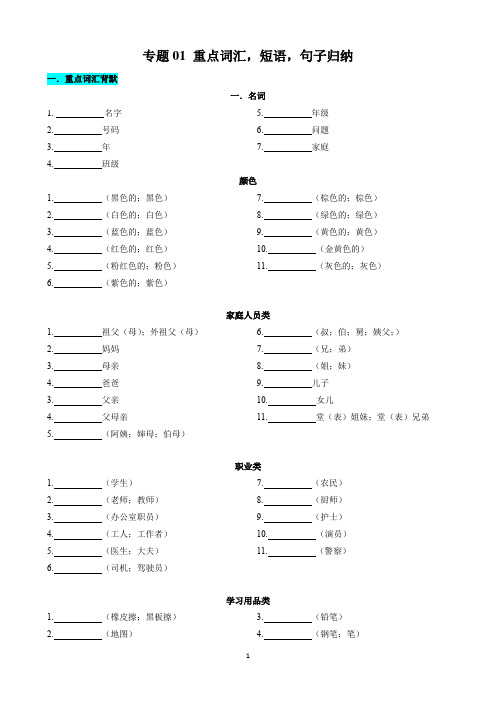
专题01 重点词汇,短语,句子归纳一.重点词汇背默一.名词1.名字2. 号码3. 年4. 班级5. 年级6. 问题7. 家庭颜色1. (黑色的;黑色)2. (白色的;白色)3. (蓝色的;蓝色)4. (红色的;红色)5. (粉红色的;粉色)6. (紫色的;紫色)7. (棕色的;棕色)8. (绿色的;绿色)9. (黄色的;黄色)10. (金黄色的)11. (灰色的;灰色)家庭人员类1. 祖父(母);外祖父(母)2. 妈妈3. 母亲4. 爸爸3. 父亲4. 父母亲5. (阿姨;婶母;伯母)6. (叔;伯;舅;姨父;)7. (兄;弟)8. (姐;妹)9. 儿子10. 女儿11. 堂(表)姐妹;堂(表)兄弟职业类1. (学生)2. (老师;教师)3. (办公室职员)4. (工人;工作者)5. (医生;大夫)6. (司机;驾驶员)7. (农民)8. (厨师)9. (护士)10. (演员)11. (警察)学习用品类1. (橡皮擦;黑板擦)2. (地图)3. (铅笔)4. (钢笔;笔)5. (尺子;直尺)6. (书;本子)7. (书包)8. (小刀)三餐1. 早餐2. 午餐3. 晚餐,正餐时间类1. 早上2. 下午3. 晚上4. 明天5. 今天6. 上午,午前①人称代词:→主格I you she he it we you they →宾格①物主代词:→形容词性:→名词性:①指示代词:→近指:this(单数)→ (复数)→远指:that(单数)→ (复数)。
七年级英语上册 期中复习知识点整理
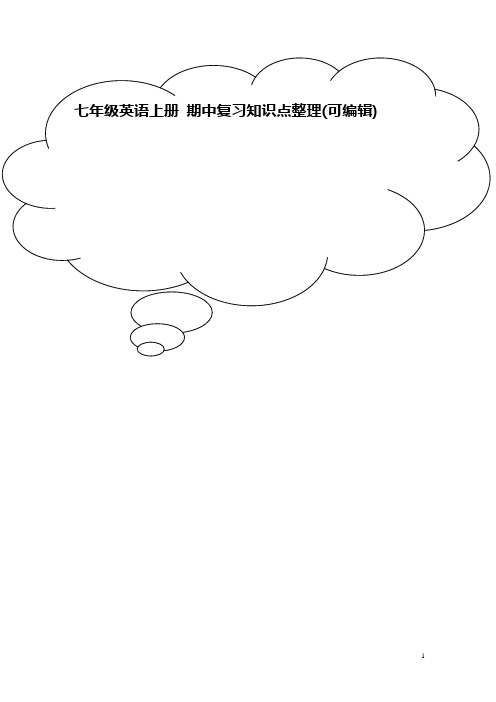
七年级上册期中英语复习资料姓名______________Starter unit1- 3知识点汇总一、文化常识1、英语文化区域,熟人之间见面,常要互相问好。
早上用语Good morning !下午用语Good afternoon !晚上(下午5点之后,晚上九点以前)用语Good evening ! .晚上九点以后要说“Good night!晚安!”例如:(1) Bob: Good morning , Helen !Helen : Good morning , Bob !(2) Bob : Good afternoon , Helen !Helen : Good afternoon , Bob ! ( 注意句子标点)(3) Bob : Good evening , Helen !Helen : Good evening , Bob !2、在轻松场合中,人们常用Hello 或者Hi 打招呼,但是两人用语要一致,不能一个人用Hello,另一个人用Hi 。
例如:(1) Helen : Hi , Bob ! Bob : Hi , Helen !(2) Helen : Hello , Bob ! Bob : Hello , Helen !二、几个功能句型1、问答“身体健康"用语。
How + be (am,is,are) + 主语? How is your brother/Tom?Bob: Hi, Helen! How are you?喂,海伦!你好吗?Helen: Hi, Bob! I'm fine, thanks. How are you?Bob:I’m fine, too。
我也很好。
对方关心你的健康,你也要询问对方的健康,而且一定要向对方说谢谢。
How are you?可以用简略语言:And you?用以询问对方的身体健康状况,它多用于朋友或熟人之间。
I'm fine = I’m OK= I’m well,表示“我很好!”Thanks = Thank you!谢谢!2、问一个东西的“英语名字”的常用句型Helen: What’s this / that in English? 这个∕那个用英语怎么说?↘(答句中,一定用it 代替this / that) Bob: It’s a / an + 英语名称。
英语初一上册期中考试知识点

英语初一上册期中考试知识点1.英语初一上册期中考试知识点一、48个国际音标及26个英文字母的正确书写要熟练掌握元音和辅音,5个元音字母(a, e, i, o, u),字母的正确占格及单词间距。
二、be动词的用法be动词有三种变形,分别是:am, is, are。
记忆口诀:“我”用am, “你”用are, is用于“他、她、它”;单数全都用i s,复数全部都用are。
三、人称及人称代词的不同形式(主格和宾格)1、三种人称:第一人称(I, we),第二人称(you, you),第三人称(he, she, it, Maria)。
2、人称代词的主格,即人称代词位于句子主语位置时的形态:I, We, You, You, He, She, It, Maria。
3、人称代词的宾格,即人称代词位于句子宾语位置时的形态:me, us, you, you, him, her, it。
4、形容词性物主代词:my, our, your, your, his, her, its, th eir。
5、名词性物主代词:mine, ours, yours, yours, his, hers, its, theirs。
6、反身代词:myself, ourselves, yourself, yourselves, hims elf, herself, itself, themselves。
四、基数词(表示数量多少的词,大致相当于代数里的自然数)zero, one, two, three, four, five, six, seven, eight, nine, ten, eleven, twelve, thirteen, fourteen, fifteen, sixteen, seven teen, eighteen, nineteen, twenty, twenty-one, twenty-two, tw enty-three,twenty-four, twenty-five, twenty-six, twenty-seven, twenty-eight, twenty-nine, thirty, forty, fifty, sixty,seventy, eighty, ninety, one hundred,one hundred and one。
人教版(2024)七年级英语上册期中综合复习专题02 重点语法,书面表达归纳(记忆版)
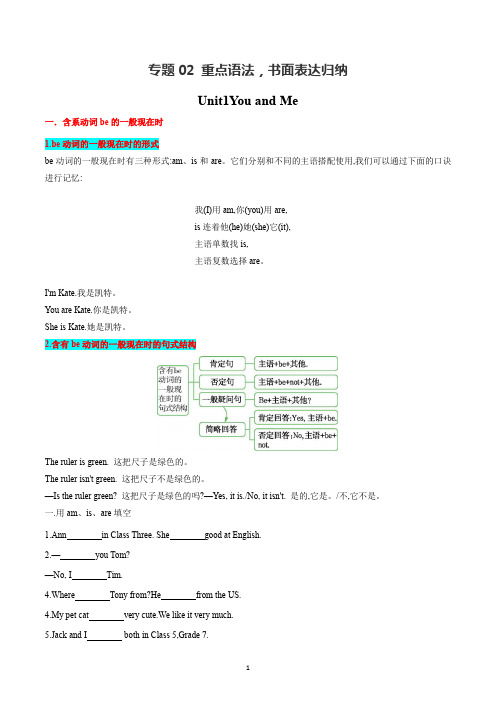
专题02 重点语法,书面表达归纳Unit1You and Me一.含系动词be的一般现在时1.be动词的一般现在时的形式be动词的一般现在时有三种形式:am、is和are。
它们分别和不同的主语搭配使用,我们可以通过下面的口诀进行记忆:我(I)用am,你(you)用are,is连着他(he)她(she)它(it),主语单数找is,主语复数选择are。
I'm Kate.我是凯特。
You are Kate.你是凯特。
She is Kate.她是凯特。
2.含有be动词的一般现在时的句式结构The ruler is green. 这把尺子是绿色的。
The ruler isn't green. 这把尺子不是绿色的。
—Is the ruler green? 这把尺子是绿色的吗?—Yes, it is./No, it isn't. 是的,它是。
/不,它不是。
一.用am、is、are填空1.Ann in Class Three. She good at English.2.—you Tom?—No, I Tim.4.Where Tony from?He from the US.4.My pet cat very cute.We like it very much.5.Jack and I both in Class 5,Grade 7.1.is,is2.Are,am3.is,is4. is5.are二.人称代词主格1.人称代词主格第一人称第二人称第三人称单数复数单数复数单数复数I 我we我们you你you你们he他she她it它they他/她/它们2.人称代词主格的用法后的谓语动词用单数形式;we/you/they后的谓语动词用复数形式;I 后接be动词时用am,接实义动词时用原形。
She is my sister and I am her brother. 她是我的姐姐,我是她的弟弟。
It is a bird.它是一只鸟。
七年级上册英语期中考试知识点
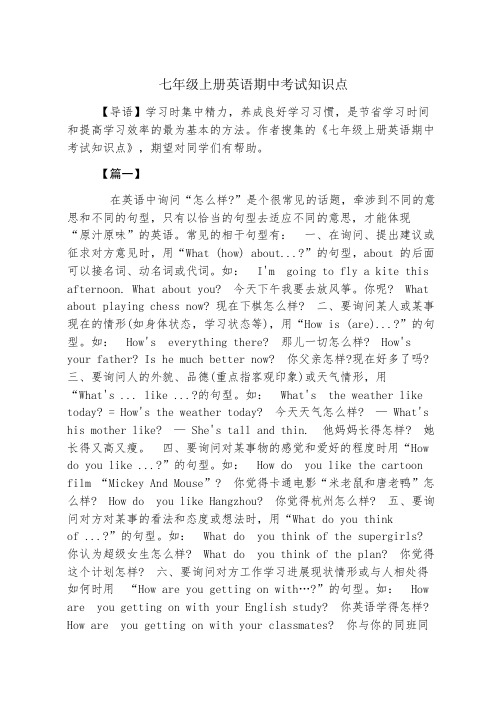
七年级上册英语期中考试知识点【导语】学习时集中精力,养成良好学习习惯,是节省学习时间和提高学习效率的最为基本的方法。
作者搜集的《七年级上册英语期中考试知识点》,期望对同学们有帮助。
【篇一】在英语中询问“怎么样?”是个很常见的话题,牵涉到不同的意思和不同的句型,只有以恰当的句型去适应不同的意思,才能体现“原汁原味”的英语。
常见的相干句型有:一、在询问、提出建议或征求对方意见时,用“What (how) about...?”的句型,about 的后面可以接名词、动名词或代词。
如: I'm going to fly a kite this afternoon. What about you? 今天下午我要去放风筝。
你呢? What about playing chess now? 现在下棋怎么样? 二、要询问某人或某事现在的情形(如身体状态,学习状态等),用“How is (are)...?”的句型。
如: How's everything there? 那儿一切怎么样? How's your father? Is he much better now? 你父亲怎样?现在好多了吗?三、要询问人的外貌、品德(重点指客观印象)或天气情形,用“What's ... like ...?的句型。
如: What's the weather like today? = How's the weather today? 今天天气怎么样? — What's his mother like? — She's tall and thin. 他妈妈长得怎样? 她长得又高又瘦。
四、要询问对某事物的感觉和爱好的程度时用“How do you like ...?”的句型。
如: How do you like the cartoon film “Mickey And Mouse”? 你觉得卡通电影“米老鼠和唐老鸭”怎么样? How do you like Hangzhou? 你觉得杭州怎么样? 五、要询问对方对某事的看法和态度或想法时,用“What do you thinkof ...?”的句型。
七年级上学期英语期中考试知识点
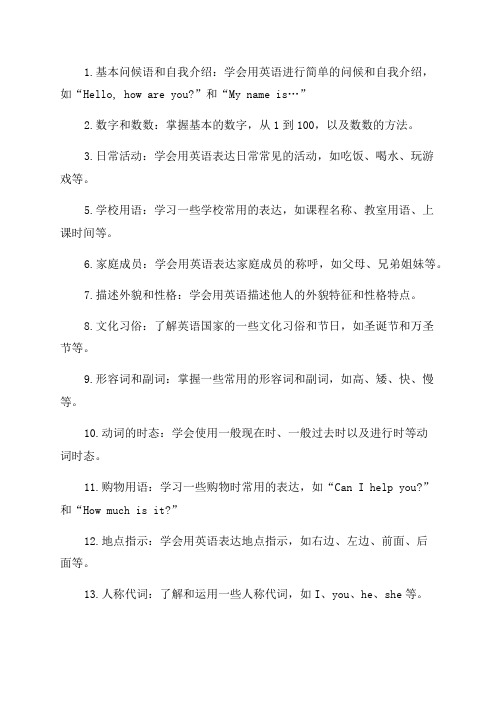
1.基本问候语和自我介绍:学会用英语进行简单的问候和自我介绍,
如“Hello, how are you?”和“My name is…”
2.数字和数数:掌握基本的数字,从1到100,以及数数的方法。
3.日常活动:学会用英语表达日常常见的活动,如吃饭、喝水、玩游
戏等。
5.学校用语:学习一些学校常用的表达,如课程名称、教室用语、上
课时间等。
6.家庭成员:学会用英语表达家庭成员的称呼,如父母、兄弟姐妹等。
7.描述外貌和性格:学会用英语描述他人的外貌特征和性格特点。
8.文化习俗:了解英语国家的一些文化习俗和节日,如圣诞节和万圣
节等。
9.形容词和副词:掌握一些常用的形容词和副词,如高、矮、快、慢等。
10.动词的时态:学会使用一般现在时、一般过去时以及进行时等动
词时态。
11.购物用语:学习一些购物时常用的表达,如“Can I help you?”
和“How much is it?”
12.地点指示:学会用英语表达地点指示,如右边、左边、前面、后
面等。
13.人称代词:了解和运用一些人称代词,如I、you、he、she等。
14.日常活动的时间状语:学会用一些时间状语来描述日常活动,如每天、通常、经常等。
15.问路和指路:学会用英语问路和指路,如“How can I get to the post office?”和“Go straight and turn left.”
这些是七年级上学期英语期中考试的基本知识点,学生要掌握这些知识点,才能顺利完成考试。
同时,学生还应多进行口语练习,提高听说能力,加强对语法知识的理解和应用。
2024新版七上英语期中知识点复习

英语期中知识点复习Starter Unit1Hello一.重点短语good morning早上好good afternoon下午好good evening晚上好二.重点句型1.How are you?你好吗?2.What's your name?你叫什么名字?My name is…3.May I have your name?我可以知道你的名字吗?Sure,my name is…当然,我叫……4.How do you spell your name?你的名字怎么拼?Goodbye./See you.再见。
5.How are you?Fine/I'm fine/'OK,thanks.你好吗?-我很好,谢谢6.Goodbye.See you.再见。
三.语法要点1.英文26个字母的正确发音和大小写形式的书写。
2.大写字母的用法:1).英语句子的第一个单词的第一个字母必须大写。
如:How are you?I`m fine。
2).表示月份、星期、重要节日的名词的第一个字母必须大写。
如:May五月Sunday星期日New Year’s Day元旦3).人名、地名、国名、某国人或某种语言等专有名词的第一个字母都必须大写。
如:Lucy露西China中国Beijing北京Chinese中国人4).书名、电影名、报刊、文章标题等中的每一个实词(如:名词、动词、形容词、副词、数词)的第一个字母一般大写。
如:Times Weekly《时代周刊》、English Weekly《英语周报》、Titanic《泰坦尼克号》5).某些缩略词的每一个字母都必须大写。
TV电视、RMB人民币、CCTV中国中央电视台、PK挑战,对决6).字母I作单词使用时(人称代词,中文意思为“我”)在句中任何位置都必须大写。
如:I’m a student.7).日常用语“OK”在句中任何位置都大写。
Is everything OK?8).表示职业、头衔和称呼的名词的第一个字母通常要大写。
译林英语七年级上册的期中复习知识点总结

have fun =have a good time 玩得开心 have breakfast/lunch/dinner do morning reading 早读 have morning meeting 开早会 start/begin lessons 开始上课 have a rest/break 休息,休息一下 do homework 写作业 go to bed 睡觉 from...to... "从...到..." do morning exercises "做早操" a lot of =lots of "许多"
14. listen to music "听音乐" listen to +某人/某物 "听某人说/听..." 15. make sb.(某人)+adj.(形容词) “使某人怎么样” 16. want to "想要做..." want to +动词原形 "想要去做某事" 17. come true "实现"(梦想,愿望,计划成为现实) 18. play ...with sb. “和某人一起玩...” 19. talk about+名词/Ving “谈论,讨论” 20. watch basketball matches “ 观看篮球赛” 21. watch match “看比赛”
practise "练习,培训"
7
practise+ n./Ving. "练习...,培训...."
8
Best wishes! =All the best.
9
“一切顺利,万事如意”
七年级上册英语期中知识点
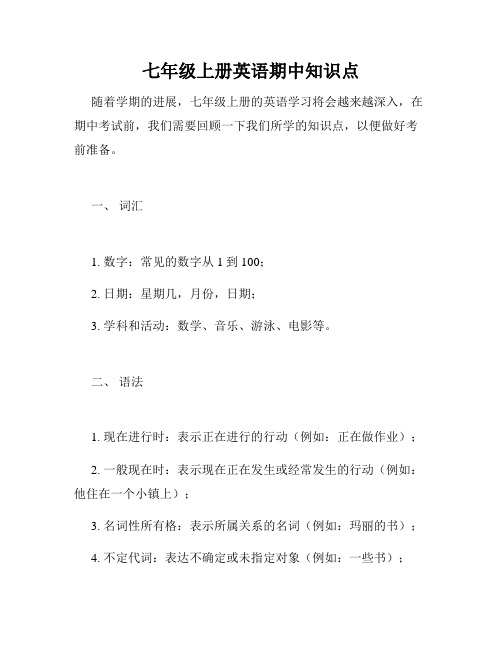
七年级上册英语期中知识点随着学期的进展,七年级上册的英语学习将会越来越深入,在期中考试前,我们需要回顾一下我们所学的知识点,以便做好考前准备。
一、词汇
1. 数字:常见的数字从1到100;
2. 日期:星期几,月份,日期;
3. 学科和活动:数学、音乐、游泳、电影等。
二、语法
1. 现在进行时:表示正在进行的行动(例如:正在做作业);
2. 一般现在时:表示现在正在发生或经常发生的行动(例如:他住在一个小镇上);
3. 名词性所有格:表示所属关系的名词(例如:玛丽的书);
4. 不定代词:表达不确定或未指定对象(例如:一些书);
5. 疑问代词:用于提问(例如:谁,哪一个);
6. 情态动词:用于表示可能性、建议、请求等(例如:可以,应该);
7. 定冠词和不定冠词:用于区别特定或未确定的名词(例如:the和a);
8. 反身代词:用于表示动作是自己施加的(例如:我自己)。
三、句型
1. 简单句:由主语和谓语组成的简单句型;
2. 并列句:两个或多个简单句通过连接词组成的复合句;
3. 疑问句:用于提问的句型;
4. 感叹句:用于表达惊喜、兴奋等情感。
四、阅读
1. 阅读理解短文:理解并回答关于一篇短文的问题;
2. 根据上下文推断单词含义:通过上下文推断单词含义;
3. 阅读文章(故事、新闻等):阅读不同类型的文章并理解。
以上就是七年级上册英语期中考试的重点。
通过回顾这些知识点,同学们可以更好地理解英语语法,提高阅读理解能力,进而在考试中获得更好的成绩。
祝愿同学们取得好成绩!。
七年级英语期中复习知识点2024
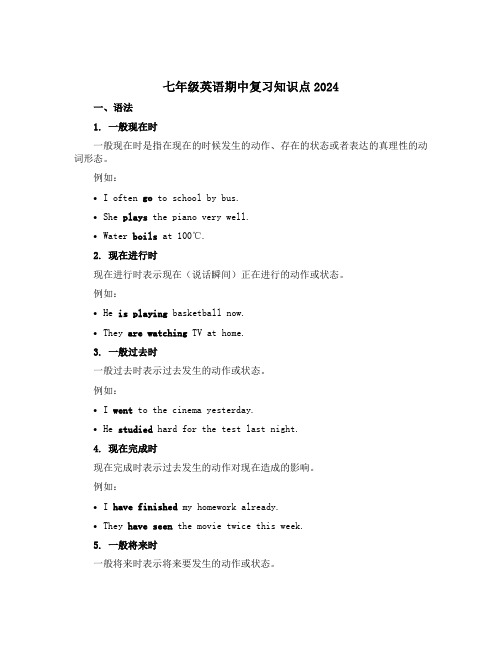
七年级英语期中复习知识点2024一、语法1. 一般现在时一般现在时是指在现在的时候发生的动作、存在的状态或者表达的真理性的动词形态。
例如:•I often go to school by bus.•She plays the piano very well.•Water boils at 100℃.2. 现在进行时现在进行时表示现在(说话瞬间)正在进行的动作或状态。
例如:•He is playing basketball now.•They are watching TV at home.3. 一般过去时一般过去时表示过去发生的动作或状态。
例如:•I went to the cinema yesterday.•He studied hard for the test last night.4. 现在完成时现在完成时表示过去发生的动作对现在造成的影响。
例如:•I have finished my homework already.•They have seen the movie twice this week.5. 一般将来时一般将来时表示将来要发生的动作或状态。
•We will have a party next weekend.•She shall travel to Beijing next month.二、单词1. 数字英文数字的说法和拼写需熟记。
例如:•1:one•2:two•3:three2. 家庭成员了解英文中家庭成员一词的表达。
例如:•父亲:father/dad•母亲:mother/mom•儿子:son•女儿:daughter3. 课程科目熟知英文中常见的学科名称。
例如:•数学:mathematics•英语:English•历史:history•物理:physics三、常用短语和句式1. 问候语英文问候语表达方式需熟记。
•早上好:Good morning.•下午好:Good afternoon.•晚上好:Good evening.2. 常见的日常表达以下是常见的日常表达。
七年级上册英语期中考试知识点汇总
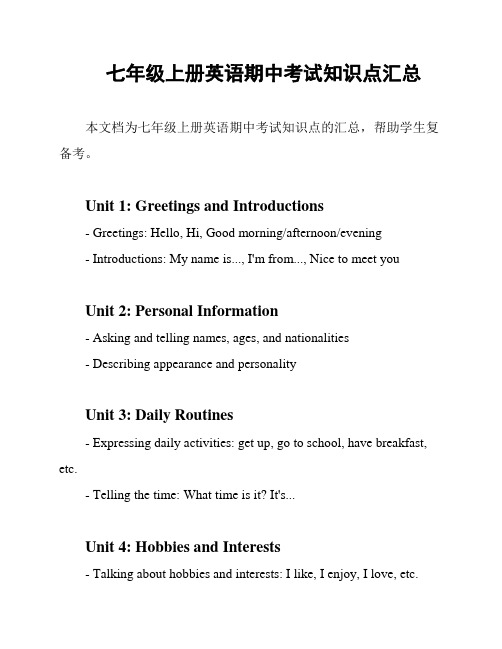
七年级上册英语期中考试知识点汇总本文档为七年级上册英语期中考试知识点的汇总,帮助学生复备考。
Unit 1: Greetings and Introductions- Greetings: Hello, Hi, Good morning/afternoon/evening- Introductions: My name is..., I'm from..., Nice to meet youUnit 2: Personal Information- Asking and telling names, ages, and nationalities- Describing appearance and personalityUnit 3: Daily Routines- Expressing daily activities: get up, go to school, have breakfast, etc.- Telling the time: What time is it? It's...Unit 4: Hobbies and Interests- Talking about hobbies and interests: I like, I enjoy, I love, etc.- Asking about others' hobbies and interestsUnit 5: School Life- Talking about subjects: English, Math, Science, etc.- Discussing schedules and daily routinesUnit 6: Family and Relationships- Discussing family members: father, mother, brother, sister, etc.- Talking about family relationships: mother and son, father and daughterUnit 7: Food and Drinks- Talking about food and drinks: rice, noodles, soup, milk, etc.- Orderin food in a restaurantUnit 8: Daily Activities- Talking about likes and dislikes: I like, I don't like, etc.- Expressing opinions and preferencesUnit 9: Seasons and Weather- Talking about seasons: spring, summer, autumn, winter- Describing weather: sunny, rainy, snowy, etc.Unit 10: Travel and Transport- Talking about means of transport: bus, train, plane, etc.- Describing travel experiences以上是七年级上册英语期中考试知识点的汇总,学生可以根据这些内容进行复习备考。
人教版七年级上册英语期中复习要点

人教版七年级上册英语期中复习要点七年级上册英语期中复要点Starter Unit 1Good morning!1. Good morning!早上好!Good afternoon!下午好!Good evening!晚上好!答语与问句相同。
2.–How are you?你好吗?答语:–I’m fine/OK, thanks.我很好,谢谢。
3.–Hello!–Hi !你好!2.–What’s this/that in English ?这个/那个用英语怎么说?回答:It's a/an+可数名词单数。
–XXX.它是一件夹克/一个橘子。
3. Spell it, please.请拼写。
4. a与ana用于子音音素(读音)开首的单词a mapan用于元音音素(读音)开首的单词an XXXStarter Unit 3What color is it?1.不定冠词a,an的用法:1)透露表现数目“一”;2)笼统地指或人或某物但不详细申明;3)泛指一类事物;4)透露表现初次提到的人或物(经常使用于引见用语中)。
2.定冠词XXX的用法:1)特指某(些)人或者事物或双方都知道的人或事物;2)上文提到过的人或物;3)世界上独一无二的事物,或某一范围内唯一的某事物。
4)某些由通俗名词组成的专著名词。
5)一些惯用语和乐器。
3.问颜色:What color is it?回答:It's+表示颜色的形容词。
4. XXX?这/那是什么回答:It's a/an+可数名词单数。
Unit 1 My name’s Gina.重点短语:XXX________phone number________first name________姓氏________family name________中学________在中国________他的电话号码________What’s=________I’m=________name’s=________重点语法:1.英文名XXX Brown中XXX为first name(名),Brown为last name或familyname(姓)。
- 1、下载文档前请自行甄别文档内容的完整性,平台不提供额外的编辑、内容补充、找答案等附加服务。
- 2、"仅部分预览"的文档,不可在线预览部分如存在完整性等问题,可反馈申请退款(可完整预览的文档不适用该条件!)。
- 3、如文档侵犯您的权益,请联系客服反馈,我们会尽快为您处理(人工客服工作时间:9:00-18:30)。
七年级上册英语期中考试知识点【篇一】在英语中询问“怎么样?”是个很常见的话题,牵涉到不同的意思和不同的句型,只有以恰当的句型去适应不同的意思,才能体现“原汁原味”的英语。
常见的相关句型有:一、在询问、提出建议或征求对方意见时,用“What (how) about...?”的句型,about 的后面可以接名词、动名词或代词。
如:I'm going to fly a kite this afternoon. What about you?今天下午我要去放风筝。
你呢?What about playing chess now? 现在下棋怎么样?二、要询问某人或某事现在的情况(如身体状况,学习状况等),用“How is (are)...?”的句型。
如:How's everything there?那儿一切怎么样?How's your father? Is he much better now?你父亲怎样?现在好多了吗?三、要询问人的外貌、品德(重点指客观印象)或天气情况,用“What's ... like ...?的句型。
如:What's the weather like today? = How's the weather today?今天天气怎么样?— What's his mother like?— She's tall and thin.他妈妈长得怎样?她长得又高又瘦。
四、要询问对某事物的感觉和喜欢的程度时用“How do you like ...?”的句型。
如:How do you like the cartoon film “Mickey And Mouse”?你觉得卡通电影“米老鼠和唐老鸭”怎么样?How do you like Hangzhou?你觉得杭州怎么样?五、要询问对方对某事的看法和态度或想法时,用“What do you think of ...?”的句型。
如:What do you think of the supergirls?你认为超级女生怎么样?What do you think of the plan?你觉得这个计划怎样?六、要询问对方工作学习进展现状情况或与人相处得如何时用“How are you getting on with…?”的句型。
如:How are you getting on with your English study?你英语学得怎样?How are you getting on with your classmates?你与你的同班同学相处得怎么样?七、要询问对方的外貌、举止等,强调主观印象,用“What do (does) ... look like?”的句型。
如:— What does Linda look like?— She looks like an engineer.琳达看起来像什么?她看上去像个工程师。
八、要询问一个人的脸色,有时也指一个人的情绪或精神状态时用“How do (does) ... look?”的句型。
如:— How does the teacher look now?— He looks very pleased.—老师现在怎样?—他看上去很高兴。
【篇二】1.下国际象棋 play chess2. 弹吉他 play the guitar3. 弹钢琴play the piano4. 拉小提琴 play the violin5. 敲鼓 play the drums.6.艺术俱乐部 art club7. 说英语 speak English8. 擅长 be good at doing9. 善于应付…的;对…有办法be good with10. 对… 有好处be good for11.参加俱乐部 join the club12. 讲故事 tell stories13. 练功夫 do Kungfu14. 帮助某人做某事 help sb. with sth.15. help sb. (to) do sth. 帮助某人做某事16. 交朋友. make friends17. 在周末 on the weekend/ on the weekend.18. Can you play the guitar? can ①能够,会。
情态动词 can + v. 原形/ can’t + V. 原形没有人称和时态的变化③情态动词加动词原形构成谓语 .Can you swim? Yes, I can. / No, I can’t.19.What club do you want to join? I want to join the art club.【篇三】一、须掌握以下语法:1、名词复数形式及其用法 (复习课本113-114页)①名词后面直接加s,如:apples, bananas②以s, x, sh, ch结尾的名词在后面加 es,如:classes, boxes, dishes, watches③词尾为辅音字母加y结尾的名词,将y变为i再加es,如: baby-- babies④词尾为f,fe的单词,改fe为 ves ,如:knife - knives写出以下名词的复数形式shoe----shoes shirt----shirts photo----photos bus----buses class-----classesglass----glasses dress----dresses box------boxes watch-----watches baby----babies knife-----knives woman-----women man ----men foot----feet Chinese-----Chinese注意:当句中出现these, those, they, are, different等关键词时,须用名词的复数形式2、冠词 : a, an , the ( 复习117页)以元音开头,须与an连用的名词有:apple, orange, egg, eraser以元音开头,须与an连用的形容词有:old, English, American如: an old ruler, an old man , an English teacher, an English class, an American girl 3、代词 (见课本115页)人称代词:主语用主格,动词和介词后用宾格如:1) 请帮我们找到他/她。
Please help us find him / her.2) 请把它给我/他们。
Please give it to me / them.物主代词:形容词性物主代词+ 名词= 名词性物主代词注意:形容词性物主代词不可单独使用,后面必须跟上名词指示代词:this/ that 只可第一次出现时用,回答需该为it.these/ those 只可第一次出现时用,回答需该为they.4、动词be动词口诀:I用 am,you用 are,is跟着he, she, it ,复数形式都用 are.但注意:My friend and I are in the same class. My brother and I are in different classes.He and she are in different clothes. 须先人后己,两个人以上,即使有I也得用are.助动词: do / does 须+动词原形(只用于疑问句和否定句中)5、数词(115页)6. 名词所有格-----名词后加’s ,既相当于形容词性物主代词的用法,又相当于名词性物主代词的用法。
( 复习114页)我朋友的名字my friend’s name他妈妈的包his mom’s bagJane和 Maria的书桌Jane and Maria’s deskTom和 Jim的鞋子Tom’s and Jim’s shoes7、形容词:写出并掌握以下几对反义词。
tall---short long-----short old-----young new-----old big-----small还须掌握strong / wide / round / brown / white 等表示颜色的形容词他长着大嘴和褐色短发。
He has a wide mouth and short brown hair.二、须掌握以下重点句型1、须掌握118页重点特殊疑问句:第1—7 句,第 16,17,18,21,22,24,26,27,28 等问句及回答。
2、区别特殊疑问句和一般疑问句:特殊疑问句必须开头有What, who, where, how 等疑问词,且回答不可用Yes或 No.一般疑问句大都以be动词 (am, is, are)或以助动词 (do, does) 及can 开头,回答必须用Yes 或 No,或Sorry.1. 一般疑问句:Do you have long hair? Yes, I do. No, I don't. / Yes, we do. No, we don't.Does she / he have big eyes? Yes, she / he does. No, she / he doesn't.Do they have new friends? Yes, they do. No, they don't.。
